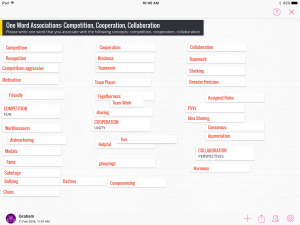In reflection of my mini-lesson given on the topic of competition cooperation, and collaboration, it was extremely interesting to see how people related to the different terms I presented. It is striking to see that, yes indeed a significant amount of people have extraordinarily negative emotions connected to competition and some pretty idealistic association when it comes to cooperation and collaboration. This can be seen below.

In a debrief of the actual lesson, overall I thought it went extremely well. A lot of new ideas brought up, some of my assumptions confirmed, and a few debunked. Here are a few highlights for my to take forward into more exploration of my inquiry topic.
The fact one group gave up when the other group finished first. The helplessness when they lost was evident and I can see how people could feel this way when they lose. This was unplanned as they were supposed to finish the task but gave up, and provided insight into this phenomena.
- In discussion after the lesson with some colleagues, we talked about the prerequisites that competition requires to be successful. Sports really shows this in that there exists a non written “ethical code of sportsmanship” within each sports and it is really evident when players don’t abide by it. In cases like this, the player didn’t receive (or comprehend) this code in their education of the sport or competition in general.
- Additionally, few of my assumptions were confirmed. The Word Wall on Padlet showed that when people think about competition, their thirst are primarily negative. Words like hopelessness, disheartening, bullying, sabotage all were present and showed that people have had very negative experiences with competition in the past, an issue I think has to do with framing how competition should exists.
- Finally, it took longer to complete the task in a collaborative- competitive environment than in a teamwork-cooperation environment. This confirmed my suspicion that collaboration, while beneficial to an open sharing, trusting exchange of ideas, it is less effective for task completion. I think there are times when collaboration is appropriate and others where cooperation works better to complete the task.
Moving forward, I am excited to explore a few more of these ideas, particularly in relation to the link between competition and collaboration. It should prove interesting to see if we can find a way to connect these two seemingly exclusive concepts.